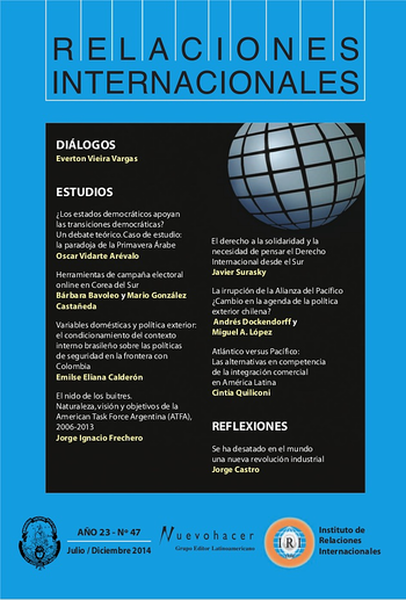Atlántico versus Pacífico: Las alternativas en competencia de la integración comercial en América Latina
Keywords:
Acuerdos Preferenciales de Comercio, Estados Unidos, Brasil, América Latina, DifusiónAbstract
Preferential Trade Agreements (PTAs) have rapidly proliferated in Latin America since the 2000s; this paper examines the factors which have facilitated or hampered their diffusion. The paper argues that the diffusion of PTAs, and resistance against them, has resulted in two alternative trade integration models. On one hand, there is diffusion of U.S.-led neoliberal North-South PTAs in Central American and Latin American countries on the Pacific Basin. On the other hand, the reinforcement of post-liberal regionalism led by Brazil and MERCOSUR countries has acted as a firewall of resistance to the diffusion of U.S.-led PTAs and their neoliberal policies. This paper first discusses how the competitive diffusion of U.S.-led PTAs started in Latin America. It then analyzes two intertwined dynamics (international-regional and institutional-domestic) that explain why U.S.-led PTAs have proliferated in the region. The third section explores MERCOSUR’s reactions to the U.S. competitive PTA diffusion and also how Brazilian leadership has evolved in the South American sub-region to encircle U.S. diffusion of PTAs, leading to an outcome of two different patterns of integration in Latin America.
Downloads
Downloads
Published
How to Cite
Issue
Section
License
Aquellos autores/as que tengan publicaciones con esta revista, aceptan los términos siguientes:
- Los autores/as conservarán sus derechos de autor y garantizarán a la revista el derecho de primera publicación de su obra. A partir de noviembre del 2020 los artículos se publicarán en la revista bajo una licencia Creative Commons Atribución- NoComercial-CompartirIgual 4.0 Internacional (CC BY-NC-SA 4.0). Acorde a estos términos, el material se puede compartir (copiar y redistribuir en cualquier medio o formato) y adaptar (remezclar, transformar y crear a partir del material otra obra), siempre que a) se cite la autoría y la fuente original de su publicación (revista y URL de la obra), b) no se use para fines comerciales y c) se mantengan los mismos términos de la licencia.
Previo a esta fecha los artículos se publicaron en la revista bajo una Licencia de reconocimiento de Creative Commons (BY-SA 2.5). - Los autores/as podrán adoptar otros acuerdos de licencia no exclusiva de distribución de la versión de la obra publicada (p. ej.: depositarla en un archivo telemático institucional o publicarla en un volumen monográfico) siempre que se indique la publicación inicial en esta revista.
- Se permite y recomienda a los autores/as difundir su obra a través de Internet (p. ej.: en archivos telemáticos institucionales o en su página web) antes y durante el proceso de envío, lo cual puede producir intercambios interesantes y aumentar las citas de la obra publicada. (Véase El efecto del acceso abierto).

























